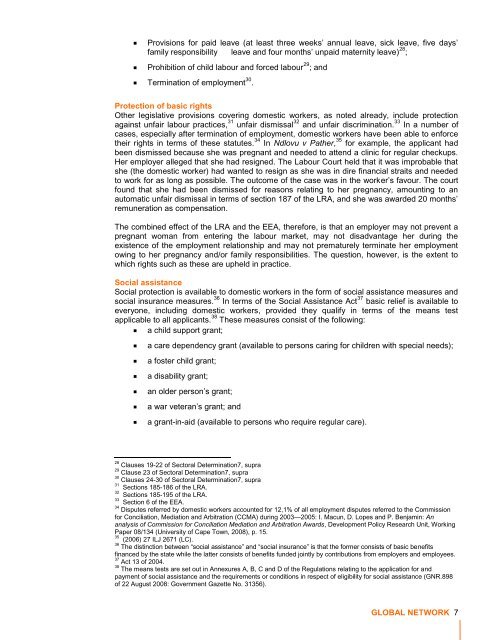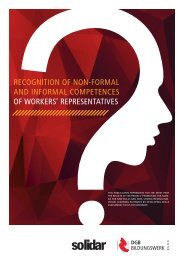domestic workers: decent work for all â south africa - Solidar
domestic workers: decent work for all â south africa - Solidar
domestic workers: decent work for all â south africa - Solidar
Create successful ePaper yourself
Turn your PDF publications into a flip-book with our unique Google optimized e-Paper software.
• Provisions <strong>for</strong> paid leave (at least three weeks’ annual leave, sick leave, five days’<br />
family responsibility leave and four months’ unpaid maternity leave) 28 ;<br />
• Prohibition of child labour and <strong>for</strong>ced labour 29 ; and<br />
• Termination of employment 30 .<br />
Protection of basic rights<br />
Other legislative provisions covering <strong>domestic</strong> <strong><strong>work</strong>ers</strong>, as noted already, include protection<br />
against unfair labour practices, 31 unfair dismissal 32 and unfair discrimination. 33 In a number of<br />
cases, especi<strong>all</strong>y after termination of employment, <strong>domestic</strong> <strong><strong>work</strong>ers</strong> have been able to en<strong>for</strong>ce<br />
their rights in terms of these statutes. 34 In Ndlovu v Pather, 35 <strong>for</strong> example, the applicant had<br />
been dismissed because she was pregnant and needed to attend a clinic <strong>for</strong> regular checkups.<br />
Her employer <strong>all</strong>eged that she had resigned. The Labour Court held that it was improbable that<br />
she (the <strong>domestic</strong> <strong>work</strong>er) had wanted to resign as she was in dire financial straits and needed<br />
to <strong>work</strong> <strong>for</strong> as long as possible. The outcome of the case was in the <strong>work</strong>er’s favour. The court<br />
found that she had been dismissed <strong>for</strong> reasons relating to her pregnancy, amounting to an<br />
automatic unfair dismissal in terms of section 187 of the LRA, and she was awarded 20 months’<br />
remuneration as compensation.<br />
The combined effect of the LRA and the EEA, there<strong>for</strong>e, is that an employer may not prevent a<br />
pregnant woman from entering the labour market, may not disadvantage her during the<br />
existence of the employment relationship and may not prematurely terminate her employment<br />
owing to her pregnancy and/or family responsibilities. The question, however, is the extent to<br />
which rights such as these are upheld in practice.<br />
Social assistance<br />
Social protection is available to <strong>domestic</strong> <strong><strong>work</strong>ers</strong> in the <strong>for</strong>m of social assistance measures and<br />
social insurance measures. 36 In terms of the Social Assistance Act 37 basic relief is available to<br />
everyone, including <strong>domestic</strong> <strong><strong>work</strong>ers</strong>, provided they qualify in terms of the means test<br />
applicable to <strong>all</strong> applicants. 38 These measures consist of the following:<br />
• a child support grant;<br />
• a care dependency grant (available to persons caring <strong>for</strong> children with special needs);<br />
• a foster child grant;<br />
• a disability grant;<br />
• an older person’s grant;<br />
• a war veteran’s grant; and<br />
• a grant-in-aid (available to persons who require regular care).<br />
28 Clauses 19-22 of Sectoral Determination7, supra<br />
29 Clause 23 of Sectoral Determination7, supra<br />
30 Clauses 24-30 of Sectoral Determination7, supra<br />
31 Sections 185-186 of the LRA.<br />
32 Sections 185-195 of the LRA.<br />
33 Section 6 of the EEA.<br />
34 Disputes referred by <strong>domestic</strong> <strong><strong>work</strong>ers</strong> accounted <strong>for</strong> 12,1% of <strong>all</strong> employment disputes referred to the Commission<br />
<strong>for</strong> Conciliation, Mediation and Arbitration (CCMA) during 2003—2005: I. Macun, D. Lopes and P. Benjamin: An<br />
analysis of Commission <strong>for</strong> Conciliation Mediation and Arbitration Awards, Development Policy Research Unit, Working<br />
Paper 08/134 (University of Cape Town, 2008), p. 15.<br />
35 (2006) 27 ILJ 2671 (LC).<br />
36 The distinction between ―social assistance‖ and ―social insurance‖ is that the <strong>for</strong>mer consists of basic benefits<br />
financed by the state while the latter consists of benefits funded jointly by contributions from employers and employees.<br />
37 Act 13 of 2004.<br />
38 The means tests are set out in Annexures A, B, C and D of the Regulations relating to the application <strong>for</strong> and<br />
payment of social assistance and the requirements or conditions in respect of eligibility <strong>for</strong> social assistance (GNR.898<br />
of 22 August 2008: Government Gazette No. 31356).<br />
GLOBAL NETWORK 7
















